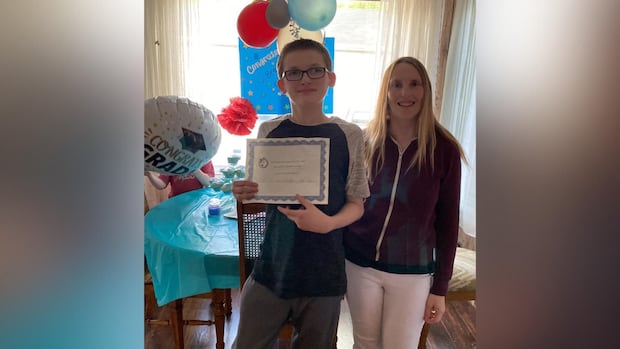SaskatoonAn inquest examining the circumstances surrounding the 2022 death of 14-year-old Brandon Schafer-Kovacs began in Saskatoon on Monday.Inquest into 2022 death of Brandon Schafer-Kovacs, 14, begins in SaskatoonAishwarya Dudha · CBC News · Posted: Aug 25, 2025 8:04 PM EDT | Last Updated: 4 hours agoBrandon Schafer-Kovacs, left, is shown in a photo with his mother, Chantelle Schafer, who told the inquest into her son’s death that staff at the group home where he lived didn’t always keep her in the loop about her son’s medical care. (Chantelle Schafer/Facebook)An inquest examining the circumstances surrounding the death of 14-year-old Brandon Schafer-Kovacs began in Saskatoon on Monday.Witnesses on the first day included the mother of the teen, a doctor who treated him on his last day alive and staff from the youth care home where he lived. Schafer-Kovacs was living at Eagle’s Nest Youth Ranch in Saskatoon, under the care of the Ministry of Social Services, when he was taken to Jim Pattison Children’s Hospital on Nov. 25, 2022. He died there on Nov. 28, 2022.Coroner Blaine Beaven is presiding over the inquest, which began Monday at the Travelodge hotel with the selection of a six-person jury. The purpose of an inquest includes establishing the medical cause and manner of death, and the coroner’s jury may make recommendations to prevent similar deaths.Teen ‘in a lot of pain,’ mother saysThe first witness was Schafer-Kovacs’s mother, Chantelle Schafer. She told the jury her son had mental health conditions — including anxiety, ADHD and prior suicide attempts — and physical health problems such as asthma, a history of pneumonia and intestinal issues.She said that Eagle’s Nest staff did not always keep her in the loop about her son’s medical care. In the nine months leading up to his death, he attended about 16 medical appointments, including visits with a psychiatrist, pediatric specialists and other doctors. Schafer said she was aware of some of those appointments but not all of them.She said she asked to see her son on Nov. 21, 2022, but said she was told he was in isolation because he was sick. She said she asked staff to take him to a doctor, but “never got a response.”Another witness later testified that Schafer-Kovacs was not isolated. When Schafer did see him later that week, she said he looked unwell.”He was slumped over the bed. He said his back hurts, and didn’t want me to go away. He was in emotional distress, and he was in a lot of pain,” Schafer told the inquest. “I never understood why they didn’t take him.”Schafer-Kovacs was taken to the hospital on Nov. 25, 2022. Schafer said by the time she learned he had been admitted to the pediatric intensive care unit, she believed he was stable, only later finding out his condition had taken a turn for the worse.’Deadly combination’ of infectionsDr. Gregory Hansen was one of the doctors who treated Schafer-Kovacs at Jim Pattison Children’s Hospital on the last day of his life. He testified that Schafer-Kovacs was critically ill and borderline unstable when he saw him. He said that he died of septic shock and multi-organ failure. He said it was likely due to a co-infection with influenza A and streptococcus pneumonia, which he said is a “deadly combination.”Hansen was asked if bringing Schafer-Kovacs to the hospital sooner could have saved him. “Absolutely, he would have had a better chance,” he said. “The earlier that these children can get antibiotics, the better.”Family members let out loud sobs and gasps at that moment. Some changes made after death: youth workerThe inquest also heard from Valentina Perrin, a youth care worker at Eagle’s Nest Youth Ranch who was on shift the week of Nov. 20, 2022.Perrin told the jury that when kids were sick, staff would typically check with a youth care leader before making decisions about medical treatment or taking them to the hospital. She said there was no working thermometer available that week and limited access to non-prescription medications. On Nov. 22, Perrin said Brandon had “cold-like symptoms” and she gave him Tylenol and Advil. On Nov. 23, she wrote that he was “horribly sick.”She said her concerns increased by Nov. 24. “He just really wasn’t getting better.… He was usually very happy and outspoken boy and just wasn’t himself that day.… I just had a gut feeling,” she told the jury. She said Brandon had dry, cracked and bleeding lips and complained about back pain.She said she informed night staff about his condition and ended her shift believing Brandon would be taken to hospital for more care. Perrin said changes were made at Eagle’s Nest after Brandon’s death, including new illness charting forms requiring staff to document specific symptoms and provide clearer guidance about when medical attention is needed.On many occasions, Perrin responded to questions from lawyers and jurors by saying she didn’t recall. Beaven, the presiding coroner, asked her what the issue was with her memory.Perrin said she has “poor memory,” is nervous and it was a long time ago. The inquest is scheduled to run until Friday and a total of 12 witnesses are expected, including more hospital staff, staff from Eagle’s Nest and others.ABOUT THE AUTHORAishwarya Dudha is a reporter for CBC Saskatchewan based in Saskatoon. She specializes in immigration, justice and cultural issues and elevating voices of vulnerable people. She has previously worked for CBC News Network and Global News. You can email her at aishwarya.dudha@cbc.ca
Teen who died in care of Sask. social services ‘horribly sick’ before taken to hospital, staff member says











